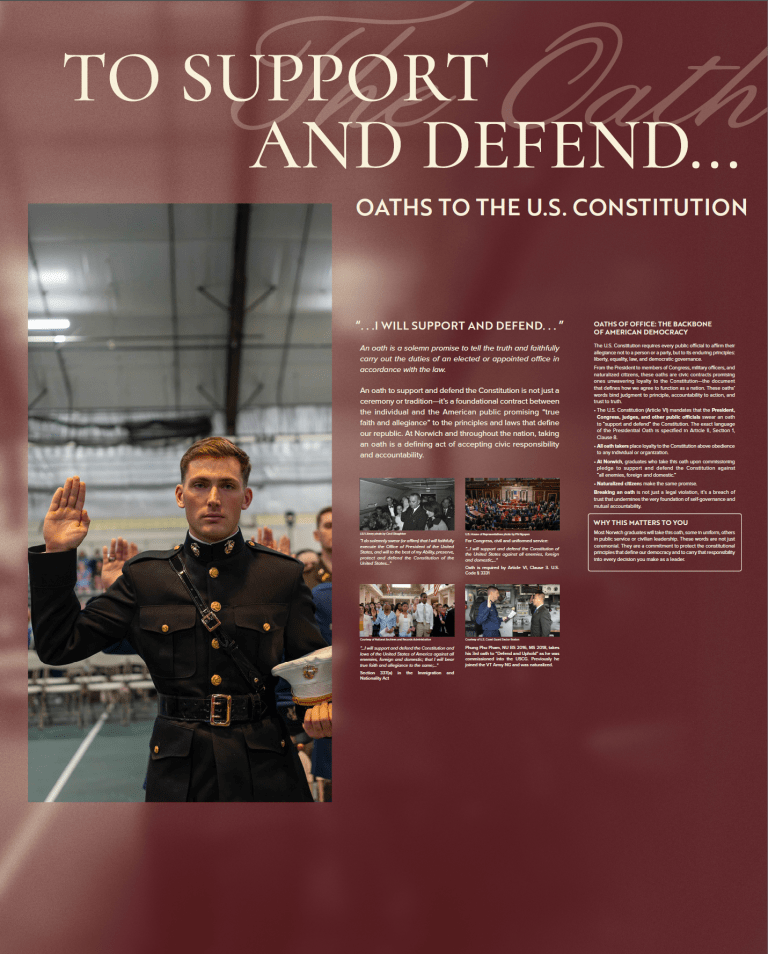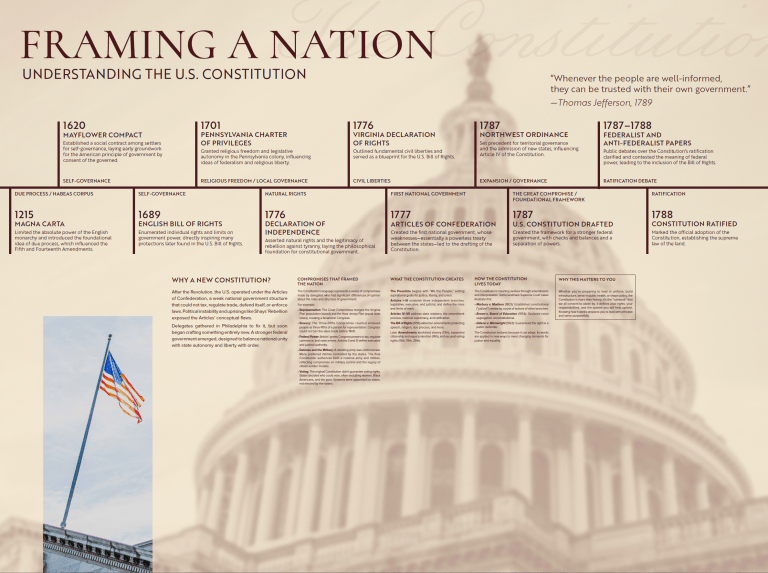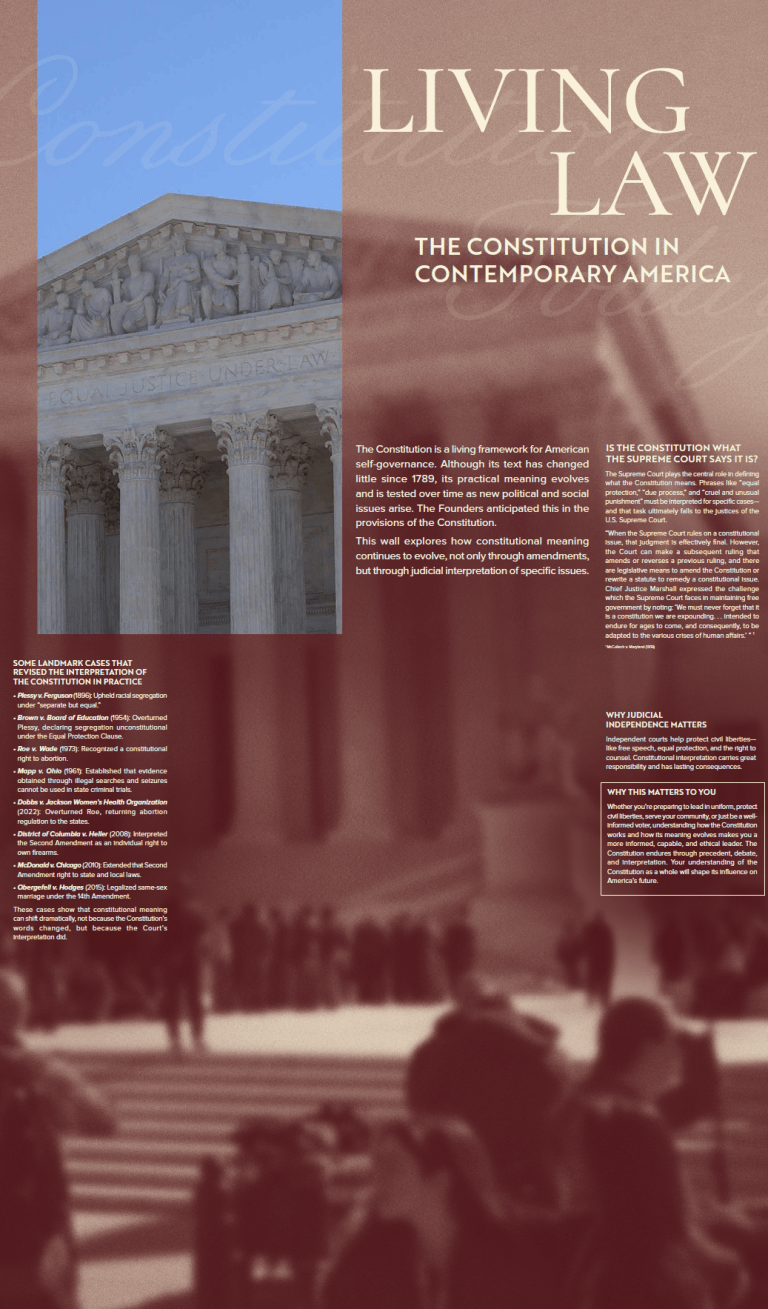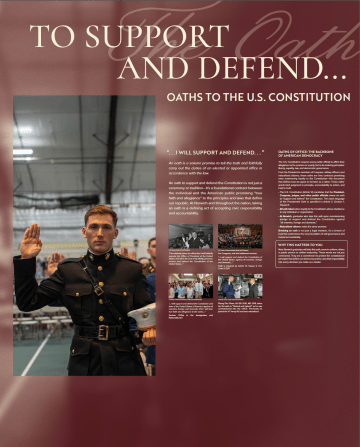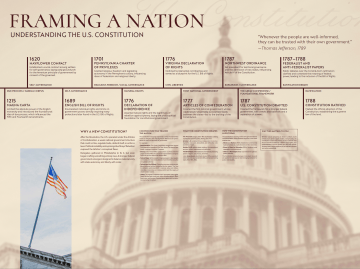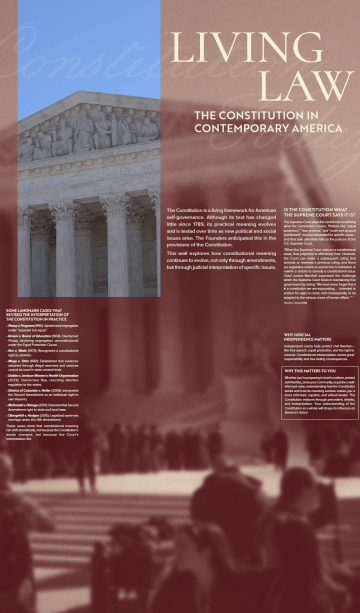The Constitution on The Hill
The Class of 1968 spearheads a movement to bring interactive constitutional education to the Norwich campus for the benefit of all.
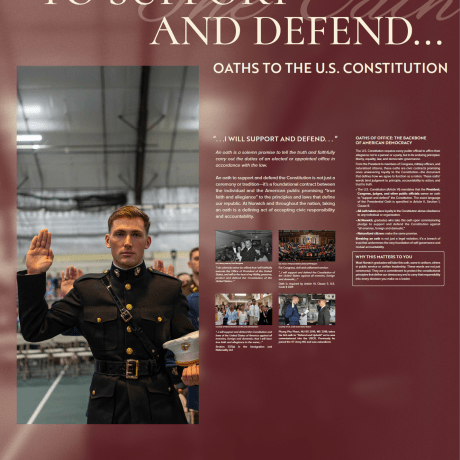
The Constitution of the United States has been a cornerstone of American society since it was ratified in 1788. Just 31 years later, Captain Alden Partridge would set out upon his quest to found a school that would produce citizens who were prepared and eager to support the young nation formed by this document through their participation in its society.
In that spirit, the Class of 1968, led by Dick Hayden ’68, began their efforts to enshrine the Constitution and educational material surrounding it on campus in such a way that people can learn and understand the founding document in deeper ways. “Norwich turns out civilian and military leaders, and it would be appropriate — if not essential — for them to have a realistic, unbiased understanding of the Constitution as a whole,” says Hayden. “The museum director at the time, John Hart, and I got to talking about the Constitution project and he mentioned a really beautiful but underutilized space in the library, the mezzanine.”
The group took the idea and ran with it, though the first part of the project will live in the lobby of the library. “We’ve got a corner there on the right when you walk into the library,” says Hayden. “We’ll start there, and it may grow — I hope it does. I would like to see Norwich identified as the go-to place for Constitutional education, but we’ve got a long way to go. We’ve just put the ball in play, and we are about to get to first base.”
Phase one of Constitution Place in the lobby will offer a one-stop interactive teaching space. It will be a launching point for the project and has its grand opening on Thursday, Sept. 18, during Constitution Week (Sept. 17-23), which just so happens to be during Homecoming.
There are three walls occupied by different displays that highlight different facets of the Constitution. “The first wall centers on oaths and looks at the meaning and significance of taking an oath to support and defend the Constitution,” says Jagemann. “It connects with Norwich tradition of commissioning citizen-soldiers; the Alden Partridge model with the broader civic practice of pledging allegiance to the Constitution whether you’re in military service or public office.”
This features a graphic affixed to the wall showing a student during a commissioning ceremony. “There is content to read about the value of the oath, oath-taking, and what that means,” he says. “When you take an oath, you’re not pledging allegiance or an oath to a person, or a president, or a party, but to support and defend the Constitution.”
The second wall would be entitled “Exploring the Constitution” and features a timeline of historical documents which led to the Constitution’s creation in 1787. It features educational content that Jagemann developed surrounding the history and development of the Constitution alongside an interactive kiosk. “You can take a deeper dive into some of the major historical documents that influenced the U.S. Constitution, including the Magna Carta, Mayflower Compact, the Declaration of Independence, and the Articles of Confederation,” says Jagemann. “You’ll see pictures of the actual document and brief explanations about what it means and how it connects to the Constitution. You’re not just reading the Constitution, you’re taking in the questions of the day that they might have come up with historically.”
“The third wall is the Constitution today,” he says. “That centers on the notion that the Constitution is still with us. We live and breathe these constitutional issues and challenges, and the interpretation of that document has changed over time.”
This wall includes an interactive kiosk that will highlight constitutional scenarios in current events. “It’s presented as a pro-con argument for what the Constitution can be; how the Constitution can be interpreted in light of that current event,” says Jagemann. “What’s neat about it is that we can solicit responses from students and others in the Norwich community, and have a process set up to keep an archive of all of these different scenarios from modern times so students can read them and reflect.”
Jagemann sees this as a crucial way to keep students civically engaged. “Studies consistently show that Americans struggle with basic civic knowledge, and surveys show that the average person doesn’t even know what the three branches of government are, or that they couldn’t identify rights enshrined in the Constitution,” he says. “This can be a refresher or a good starting place to make connections to some of the values we have at Norwich about leadership and the notion of a citizen-soldier. One of those duties and obligations of citizenship is to have an understanding of our past, present, and future, and that starts with the Constitution.”
Hayden sees a future where this can benefit not only the Norwich community, but broader local communities as well. “I would like to see, once we have it perfected internally, a world where we can do things like making this available to pre-college teachers interactively and remotely so they can provide a really crisp delivery of the principles and issues within the Constitution.”
Jagemann echoes his sentiment. “We want to have engagement with the community down the line. Maybe start small, reaching out to a high school and they can come on field trips,” he says. “Just as students visit the Sullivan Museum, this could be a place where Norwich students or faculty can connect with visitors from the community.”
Constitution Place has lofty goals, but luckily, it is well on its way with the support of the Class of 1968. “My wife and I decided we’d better put our money where our mouth is,” says Hayden. “The class has raised about half a million dollars at our 55th reunion which is what’s funding Constitution Place — it’s been entirely funded by the Class of 1968.”
Hayden has made fundraising for Constitution Place a priority as he interacts with his classmates. “We’ve still got a lot more to get to the budget, but every single alumnus I’ve talked to about this for the last three years agrees this is important.”
The opportunity for civic education is ripe. “Constitution Place centers on the Constitution and civic literacy. It is important to note that civic literacy is a public good, and Norwich has a unique role in shaping leaders for public service and the military,” says Jagemann. “The Constitution isn’t just a legal document for future leaders, it’s the framework that they will serve in, whether in uniform, public service, or civil society. Hopefully, this place anchors that responsibility by equipping people with a deep appreciation for the evolution of constitutional norms.”
Constitution Place Displays
Read More
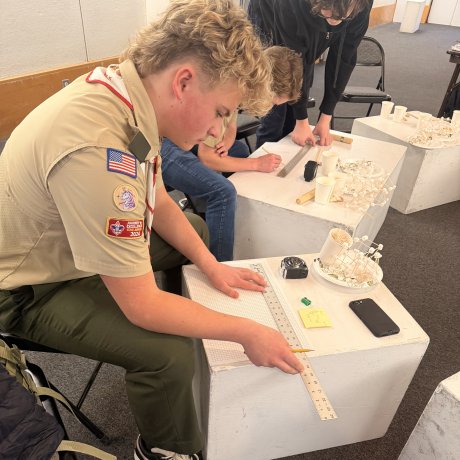
Scouting Day 2026 School of Architecture + Art Merit Badge
By Caroline Fraser '25, M'26
Local scouts take advantage of a day of learning alongside architecture students.
1 min read
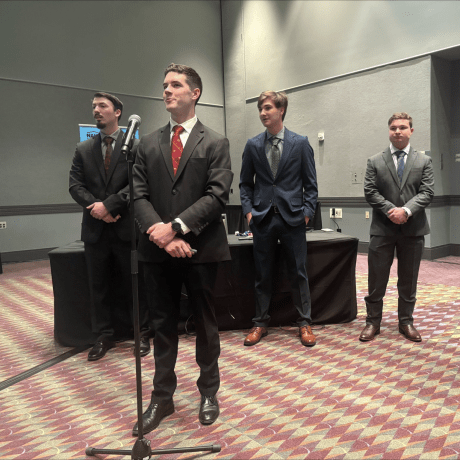
Student Engineers Take On Real-World Challenge
By Department of Civil Engineering and Construction Management
Students put their knowledge to the test in an engineering competition.
2 min read
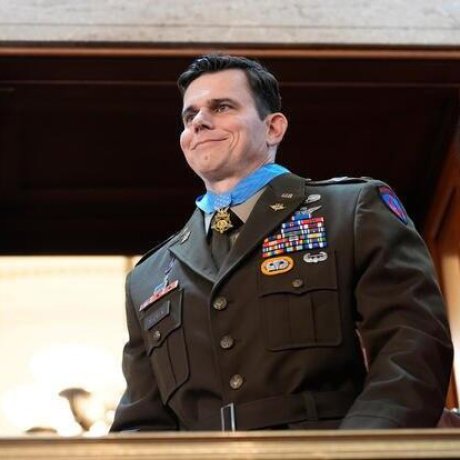
The Warrior Scholar: CW5 Eric Slover’s Medal of Honor Embodies the Norwich Spirit
By NU Marketing & Communications Office
A Norwich graduate receives the Medal of Honor during the State of the Union for his heroism — exemplifying the powerful combination of service and education in the citizen-soldier.
5 min read

